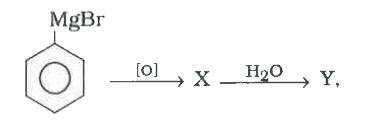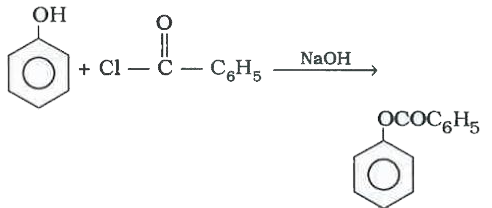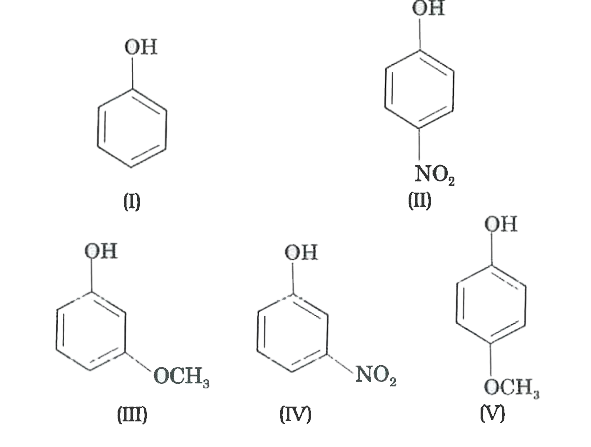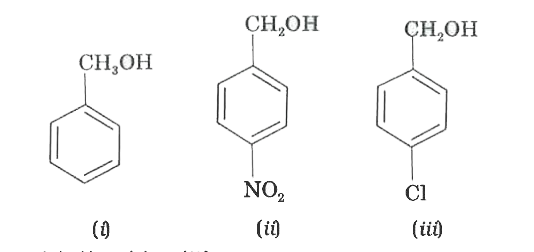Complete Solutions to Multiple Choice Questions Level - II of chapter ALCOHOLS, PHENOLS AND ETHERS of Class 12 book with complete answers and questions
| Class 12 | CHEMISTRY |
| Chapter | ALCOHOLS, PHENOLS AND ETHERS |
| MODERN PUBLICATION | Multiple Choice Questions Level - II |
| Number Of Questions | 80 |
| Academic Year | 2023-24 |
The treatment of sodium phenoxide with `CO_(2)` at 400K and 4-7 atmosphere pressure followed by acidification of the reaction product gives :
View SolutionPhenol gives salicylaldehyde on heating with `CHCl_(3)` and `NaOH`. The reaction is known as :
View SolutionWhich of the following alcohols is most reactive with HCl in the presence of `ZnCl_(2)` ?
View SolutionWhich of the following is most acidic ?
View SolutionSec-bytyl alcohol on heating with conc. `H_(2)SO_(4)` at 443 K gives :
View SolutionPhenol can be distinguished from alcohols with :
View SolutionThe acylation of salicylic acid with acetic anhydride gives :
View SolutionHBr reacts fastest with
View SolutionIn the reaction

Y is :
View SolutionPrimary, secondary and tertiary alcohols can be distinguished by :
View SolutionIn the reaction :
`Xunderset(443 K)overset(H_(2)SO_(4))(to)Yoverset(HBr)(to)Zunderset(H_(2)O)overset(KOH)(to)CH_(3)underset(OH)underset(|)(C)HCH_(3)` X is :
View SolutionAcetyl chloride reacts with phenol in the presence of dil. Alkali to give
View SolutionThe correct IUPAC name of the compound `CH_(3)CH(C_(2)H_(5))CH_(2)CH(OH)CH_(3)` is :
View SolutionWater gas when mixed with half of its volume of hydrogen and passed over a catalyst mixture of oxides of zinc, copper and chromium under 200 atm. Pressure of 623-675 K gives :
View SolutionWhich of the follwing is most easily dehydrated ?
View SolutionWhich of the following alcohols cannot be prepared by the action of a suitable Grignard reagent as an aldehyde or a ketone followed by hydrolysis ?
View SolutionWhich of the following compounds is obtained by the reaction of phenol and benzene diazonium chloride ?
View SolutionIn the reaction

Y is
View SolutionBenzene reacts with propene in the presence of `H_(3)PO_(4)` at 523 K to give :
View SolutionWhich of the following alcohols has minium reactivity with sodium metal ?
View SolutionIn the reaction :
`Xunderset(H_(2)SO_(4))overset(K_(2)Cr_(2)O_(7))(to)(CH_(3))COoverset(O)(to)CH_(3)COOH`, the compound X is :
View SolutionWhich of the following methods does not give phenol ?
View SolutionSaponification means hydrolysis of an ester with :
View SolutionWidespread deaths due to liquor poisoning are because of the :
View SolutionAn equimolar quantities of ethanol and methanol are heated with conc. `H_(2)SO_(4)`. The product formed is :
View SolutionThe reaction :
 is an example of
is an example of
View SolutionWhich of the following is most acidic ?
View SolutionHow many isomeric acyclic alcohols and ethers are possible for `C_(4)H_(8)O` ?
View SolutionWhat is formed when primary alcohol undergoes catalytic dehydrogenation ?
View SolutionAn example of benzylic alcohol is :
View SolutionIn the reaction.
`C_(6)H_(5)Br+Mgoverset("Ether")(to)A+CH_(3)COCH_(3)toBunderset(H_(2)O)overset(H^(+))(to)C`, C is :
View SolutionThe most reactive alcohol towards hydrogen halides is :
View SolutionNitroglycerine is an explosive substance. Its formula is :
View SolutionIn the reaction :
`CH_(3)underset(OH" ")underset(|" ")(CH)CH_(2)CH_(3)overset(H_(2)CrO_(4))(to)Aunderset((ii)H^(+),H_(2)O)overset((i)CH_(3)CH_(2)CH_(2)MgBr)(to)B`, the product B is :
View SolutionIn the reaction
 the product B is :
the product B is :
View SolutionMethanol is manufactured by passing compressed water gas with excess of hydrogen over :
View SolutionWhich of the following intermediate is formed in the acid catalysed dehydration of n-propyl alcohol ?
View SolutionA compound X with molecular formula `C_(3)H_(8)O` can be oxidised to a compound Y with the molecular formula `C_(3)H_(6)O_(2)`. X is most likely to be :
View SolutionWhich of the following reagents will convert glycerol to acrolein ?
View SolutionWhich of the following is used as an antifreeze ?
View SolutionThe reaction :
`ubrace(CO+H_(2))_("Water gas")+H_(2)underset("673 K, 300 atm")overset(Cr_(2)O_(3),ZnO)(to)` may be used for the manufacture of
View SolutionThe compound which does not change the orange colour of chromic acid (i.e. chromic anhydride in `H_(2)SO_(4)` ) to blue green is :
View SolutionWhen 3,3-dimethyl butan-2-ol is heated with conc. `H_(2)SO_(4)`, then main product formed is :
View SolutionConsider the following alcohols :
(1) 1-Phenyl-1-propanol
(2) 3-Pheny-1-propanol
(3) 1-Phenyl-2-propanol
The correct sequence of increaseing order of reactivity of these alcohols in their reaction with HBr is
View SolutionWhich one of the following reaction will yield 2-propanol ?
(I) `CH_(2)=CH-CH_(3)+H_(2)Ooverset(H+)(to)`
(II) `CH_(3)CHOunderset(H_(2)O)overset(CH_(3)MgI)(to)`
(III) `HCHOunderset(H_(2)O)overset(C_(2)H_(5)MgI)(to)`
(IV) `CH_(2)=CH-CH_(3)overset("Neutral "KMnO_(4))(to)`
View SolutionAcetyl chloride does not react with
View Solution1-Phenyl ethanol can be prepared by reaction of benzaldehyde with :
View SolutionWhich of the following will give phenol with `CaO` and `NaOH` ?
View SolutionThe reaction of :

with HBr gives
View SolutionIn the reaction :

The product is
View SolutionPropan-1-ol can be prepared by reaction of propene with :
View SolutionAmong the following compounds, the strongest acid is :
View SolutionWhen iso-butyl magnesium bromide in dry ether is treated with absolute ethyl alcohol, the products formed are :
View Solution`CH_(3)underset(CH_(3))underset(|)overset(CH_(3))overset(|)(C)-underset(CH_(3))underset(|)(CH)-OHoverset("Conc. "H_(2)SO_(4))(to)A` major product is :
View SolutionWhich of the following gives most stable carbocation on dehydration ?
View SolutionWhich of the following is the correct order of increasing boiling points of the following :
I : Pentan-1-ol II : n-Butane
III : Pentanal IV : Ethoxy ethane
View SolutionThe correct order of increasing acid strength of the following compounds :
I. 4-Mrthylphenol II. 3-Nitrophenol
III. 2,4,6- Trinitrophenol IV . Propan-1-ol is
View SolutionWhich of the following order of acid strength is correct ?
View SolutionWhich of the following will not from a yellow precipitate on heating with an alkaline solution of iodine ?
View SolutionThe major organic product in the reaction
`CH_(3)-O-CH(CH_(3))_(2)+HIto` Product is
View SolutionEthylene oxide when treated with Grignard reagent yields :
View SolutionIn the reaction :
`CH_(3)-overset(CH_(3))overset(|)(CH)-CH_(2)-O-CH_(2)-CH_(3)+HIoverset("Heated")(to)` Which of the following compounds will be formed ?
View SolutionThe best combination of reagents for carrying out the conversion
`RCH_(2)CH_(2)OHtoRCH_(2)CH_(2)COOH`
View SolutionConsider the following reaction :
`"Ethanol"overset(PBr_(3))(to)Xoverset("alc. KOH")(to)Yunderset((ii)H_(2)O,Delta)overset((i)H_(2)SO_(4))(to)Z` The product Z is
View Solution`HOCH_(2)CH_(2)OH` on heating with periodic acid gives
View Solution`"Phenol"overset("Zn. dust")(to)Xunderset("Anhyd. "AlCl_(3))overset(CH_(3)Cl)(to)Yunderset(KMnO_(4))overset("Alkaline")(to)Z`
The product Z is
View Solution`CH_(3)CH_(2)OH` can be converted into `CH_(3)CHO` by ____________ .
View SolutionThe process of converting alkyl halides into alcohols involves ____________ .
View SolutionWhich of the following species can act as the strongest base ?
View SolutionWhich of the following compounds will react with sodium hydroxide solution in water ?
View SolutionWhich of the following is most acidic ?
View SolutionMark the correct order of decreasing acid strength of the following compounds.

View SolutionMark the correct increasing order of reactivity of the following compounds with `HBr//HCl`.

View SolutionWhich one/ones of the following reactions will give 2-propanol ? Choose the right answer from (A), (B), (C ) and (D)
I. `CH_(2)=CH-CH_(3)+H_(2)Ooverset(H^(+))(to)`
II. `CH_(3)CHOunderset((ii)H_(2)O)overset((i)CH_(3)MgI)(to)`
III. `CH_(2)Ounderset((ii)H_(2)O)overset((i)CH_(3)MgI)(to)`
IV. `CH_(2)=CH-CH_(3)overset("Neutral "KMnO_(4))(to)`
View SolutionThe general formula which represents the homologous series of alkanols is :
View SolutionIn the reaction :
`CH_(3)-underset(CH_(3))underset(|)(CH)-CH_(2)-O-CH_(2)-CH_(3)+HIoverset("Heat")(to)`
View SolutionWhich one of the following compounds has the most acidic nature ?
View SolutionGiven are cyclohexanol (I), acetic acid (II) 2,4,6-trinitrophenol (III) and phenol (IV). In these the order of decreasing acidic character will be :
View SolutionThe compound which gives turbidity immediately with Lucas reagent at room temperature is
View SolutionPhenol can be converted to o-hydroxybenzaldehyde by
View Solution
Multiple Choice Questions Level - II questions and complete solutions for chapter ALCOHOLS, PHENOLS AND ETHERS of MODERN PUBLICATION CHEMISTRY (KANNADA ENGLISH) of Class 12